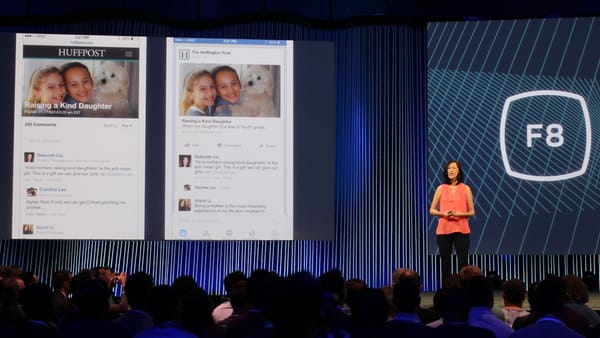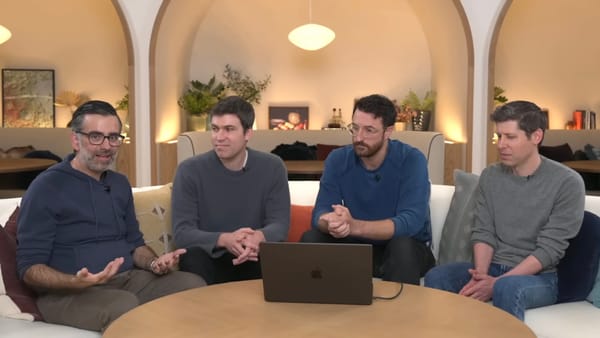WTN #5: How Cloudflare Is Both AI Police and AI Booster
Welcome to Web Technology News (WTN), my weekly newsletter tracking what's next on the web. This week I look at some of the moves Cloudflare has been making to help web publishers and content creators deal with AI companies that "leverage" (to put it politely) open web content. I spoke to a Cloudflare exec for a reported story on The New Stack, and I was somewhat surprised to learn the company is also heavily pushing AI technology onto its customers — specifically this week, in the article I wrote, a new NLWeb feature (NLWeb is Microsoft's brand new open protocol for integrating AI chat into your website).
Now, I like the sound of NLWeb and — as a Cloudflare user myself — I intend to try it out on my internet history website, Cybercultural. I do find it interesting that Cloudflare is attempting to position itself as both an AI police force and an AI booster (at least in its own products). I think that's clever, because I too have mixed feelings about AI, as I described last week. AI is a threat to web publishers, but it's also an intriguing technology when matched up with the web platform. Cloudflare understands that a delicate balance is required.
Let's get to the web tech news...
Web Platform
🌐 The big news this week was Google avoiding the harshest penalties in a US government monopoly case against them. Reports the New York Times (this is a gift link, so anyone can open it to read the full article):
"Google must hand over its search results and some data to rival companies but does not need to break itself up by selling its Chrome web browser, a federal judge ruled on Tuesday."
I'm no legal expert, but I am glad Google wasn't forced to sell Chrome. By and large, Google has been a good steward of web technology innovation over the years, and it would've felt unfair to strip them of a groundbreaking web product they invented and built. Also, I would much rather Google owned Chrome than the likes of OpenAI or Perplexity!
All that said, I continue to feel queezy about the massive power Google has in the web search market — clickthroughs from Google search results continue to decrease in the AI Overview era.
🌐 If you've been following the drama around XSLT, you'll want to read my TNS colleague Mary Branscombe's in-depth report on it. As well as noting that the original request to remove XSLT from the web platform came from Firefox, not Google, Mary spoke to a number of experts about the history of XSLT, its implications for the web over the years, and where this may net out. It's a great read, although you'll need to block off a bit of time as it's over 5,000 words. (disclosure: I edited this piece)
Although you should read the whole post, I do want to call attention to one part. Mary rightly focuses on XLST for much of the article, but near the end she raises the bigger issue of web governance:
"...it’s also impossible to ignore the outsized impact that Google funding so much of it [i.e. the web platform], directly or indirectly, has on choices all the browsers make about prioritizing features — especially the ones that don’t fit into current development fashion and hype, whether that’s XSLT or SVG or MathML."
🌐 Meanwhile, Microsoft browser engineer Alex Russell continues his series on browser competition in typical no-punches-pulled style:
"Apple has done violence to the founding ethos of internet and web standards development. Instead of honourably withdrawing from those groups, Apple has maintained a charade of engagement, and gaslights other participants while actively sabotaging the principle of voluntary adoption that internet standards are predicated on."
🌐 Possibly related, there's a long discussion thread on Mastodon about browsers and web standards, introduced by Jen Simmons, a Web evangelist at Apple. She ran a poll that asked (in summary):
"Should [a certain] technology be considered A Web Standard — when 1 or 2 browsers implement & ship, while 1 or 2 browsers Formally Object and say no?"
12% responded yes, it's a web standard; 88% said no.
🌐 In lighter news, Thomas Steiner — who works on the Chrome team — just wants to register his new washing machine: "Don't make me talk to people! They could still offer to register the machine by telephone as an alternative, but in 2025, the default for such things should just be the Web." 💯
Open Social Web
🦋 This week I came across Leaflet, described as "a social publishing platform for blogs / newsletters — like Substack, but more open, and frankly just nicer to use." It's being built on the AT Protocol, the same protocol powering Bluesky. One to watch. (hat-tip Boris Mann)
🧵 Meta's Threads has a new leader: Connor Hayes. In an introductory thread, Hayes said he wanted to make Threads "the most culturally relevant place for sharing perspectives and ideas on the internet." What wasn't mentioned in his thread? The fediverse, which Threads is supposedly a part of. 🤔
🦣 In actual fediverse news, WordPress has updated its ActivityPub plugin. Fairly minor updates, but as Jeff Sikes pointed out, "quite intriguing to see tooling to monitor the progress of a self destruct request." (I've had issues with deleting content via a WP AP plugin before, although I will say the main developer, Matthias Pfefferle, has always been incredibly helpful.)
🚶 Not news, but this week I discovered the concept of "internet walks", explained here by Kristoffer Tjalve in Lullaby Magazine:
"These internet walks invite people to start exploring again, which in the 90s was a real profession. You'd employ a professional surfer. Before you had search engines, you had directories and people who tried to find as many links as possible and group them. That's why you have all these terms like Safari and Netscape, inviting people to explore, though we don’t use the same words now. It feels more gated."
See also: Taking an Internet Walk, by Spencer Chang & Kristoffer Tjalve.
Web + AI
🤖 This week for The New Stack, I talked to a Cloudflare VP about its implementation of NLWeb, Microsoft's new open protocol for AI chat in websites. I also got an update on the private beta of Cloudflare's "pay-per-crawl" project, which aims to get AI companies to pay up for using the content of web publishers.
Elsewhere, Matthew Prince (CEO of Cloudflare) talked to Fred Vogelstein about building a wider scale marketplace for content:
"And so you could imagine a world in which you actually have each LLM company getting kind of a preview of content, having an algorithm score how valuable it is and then tell the writer how much he’ll get for it. And the payment isn’t based on how many words you write, just by how much you are actually adding to the knowledge base."
Prince noted that he wants to get Google onside for this idea, because that will prompt (no pun intended) the likes of OpenAI to get on board too. 🤞
🤖 CNBC: Atlassian has agreed to buy The Browser Co., which is behind the Arc and Dia web browsers. CEO Mike Cannon-Brookes seemed to suggest he wanted to build a new type of enterprise-focused work browser:
"Whatever it is that you’re actually doing in your browser is not particularly well served by a browser that was built in the name to browse. It’s not built to work, it’s not built to act, it’s not built to do."
Note: I profiled Dia when it launched as an invite-only beta in June. I was impressed with its ability to interrogate the content of a web page, but it also didn't blow my socks off. So we'll see what Atlassian builds with it.
🤖 Sarah Perez: WordPress launches an "experimental" new AI vibe coding tool for creating Gutenberg blocks, called Telex.
🤖 Food for thought from Scott Rosenberg, writing about the web's bot-versus-bot future: "Service providers and large organizations are already preparing to roll out two different versions of each website or app they support: one for people and the other for AI agents and bots."
One More Thing
🎈 I really liked this blog post by Sia Karamalegos, about "how to grow your tech career by engaging and contributing to tech communities through writing, speaking, open source, and more." Sia organizes Eleventy community meetups on Zoom, which I've popped into a few times. I'm usually having dinner when they happen, due to my time zone, so I lurk rather than participate! But I learn a lot and really appreciate Sia bringing the 11ty community together like this. Web communities are more important than ever in this era of bigco dominance.
Thanks for reading, and if you have any suggestions on news sources for Web Technology News, leave me a comment on Mastodon or Bluesky. And don't forget, you can follow WTN on those platforms too: search "@feed@webtechnology.news" on Mastodon or click here to follow on Bluesky.
You can also get the full content via email (the form is on the WTN homepage) or RSS. A benefit of signing up via email is that it allows you to post good ol' fashioned comments on the URL where this post lives: i.e. on the Web.
Until next week, keep on blogging!



